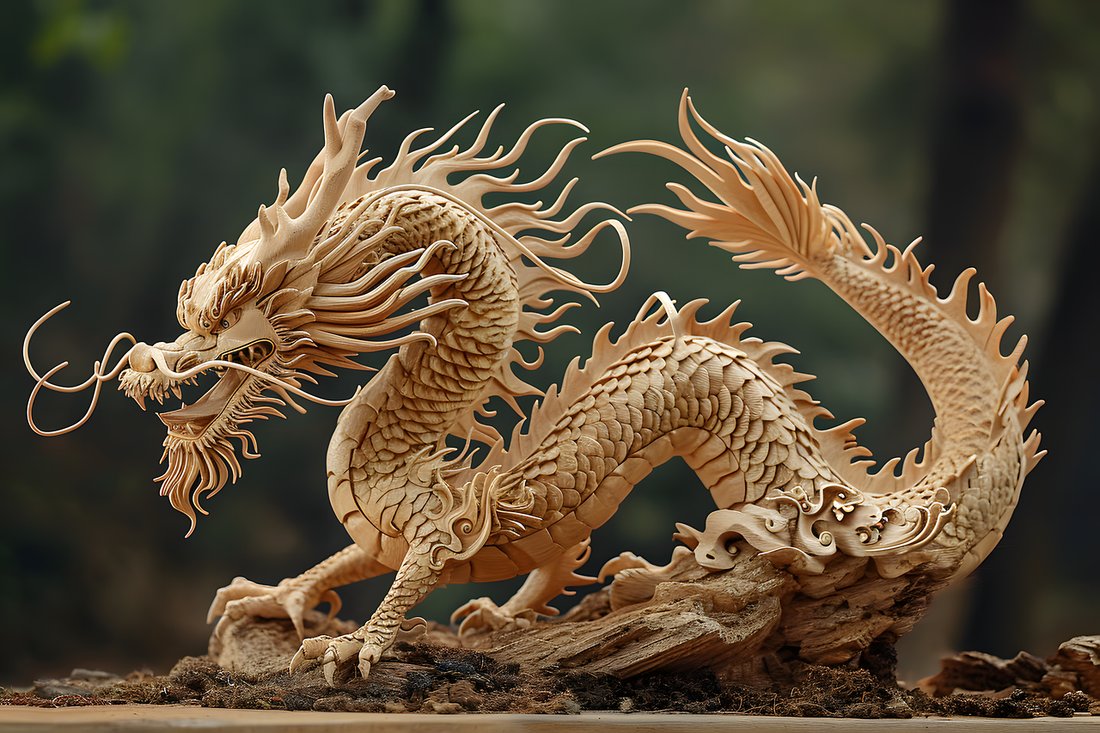
The meaning of dragons in Chinese culture – symbolism, history and myth
Share
In hardly any other culture in the world do dragons have such deep symbolic and spiritual significance as in the Chinese. Unlike Western ideas, in which dragons often appear as fire-breathing, destructive monsters, in China they are considered auspicious, powerful, and venerable beings. They are not just mythological figures, but also deeply embedded in the collective consciousness and everyday culture.
Origin and mythology of the Chinese dragon
The Chinese dragon, or Lóng (龙) in Chinese, is a mythical hybrid creature that typically combines characteristics of various animals: the body of a snake, the horns of a deer, the talons of an eagle, and the face of a camel or horse. Even in the oldest Chinese texts, such as the Shan Hai Jing (山海经), the dragon is described as a supernatural being with the ability to control water, rain, and wind.
Dragons are considered celestial beings and rulers of the waters – rivers, lakes, rain, and seas are under their influence. They embody the creative power of yang, the male, active energy, and are closely associated with the element of water and fertility.
Symbolism of the dragon in Chinese culture
The dragon is a central symbol of Chinese culture and stands for:
-
Luck and prosperity: Dragons are often associated with positive qualities such as wealth, success and fertility.
-
Imperial power: Since the Han Dynasty (206 BC – 220 AD), the dragon was considered a symbol of the emperor. Only the emperor was allowed to wear clothing with dragon motifs. The so-called "five-clawed dragon" was reserved exclusively for the ruler.
-
Protection and strength: Dragons are also worshipped as protective spirits that are supposed to protect against misfortune and evil influences.
Dragons in festivals and traditions
The worship of the dragon is particularly evident during the Chinese New Year. The famous dragon and lion dances are an integral part of the celebrations. The dragon dance ( Wǔ Lóng ) symbolizes the banishment of evil spirits and the invitation of good luck and blessings for the new year.
The dragon also plays a central role in the Dragon Boat Festival ( Duānwǔ Jié ), celebrated annually in early summer. Traditional dragon boats are launched in races—a custom that encompasses both athletic competition and spiritual purification.
The dragon in modern China
Even today, the dragon is omnipresent in China—whether in architecture, art, advertising, or as a popular motif in tattoos. It is a national symbol and an expression of national identity. In colloquial language, Chinese people sometimes refer to themselves as "descendants of the dragon" ( Lóng de chuánrén ), which expresses pride and belonging.
Conclusion
The Chinese dragon is far more than a mythical creature—it carries millennia-old symbolism, cultural values, and national identity. It blends myth and reality, past and present. Its significance ranges from spiritual concepts to the modern self-identification of a people who proudly embrace their history. In a time of change, the dragon remains a living symbol of strength, wisdom, and good fortune—in China and beyond.
Bonus fact: The Chinese horoscope recognizes twelve zodiac signs – including the dragon. Those born in the Year of the Dragon are said to have special talents, charisma, and leadership qualities.
